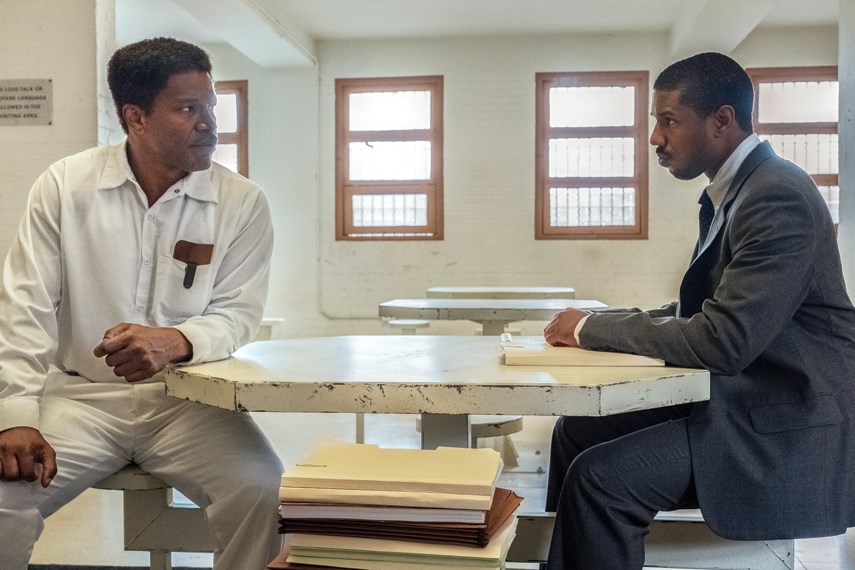Just Mercy. Directed by Destin Daniel Cretton. Starring Michael B. Jordan and Jamie Foxx. Rating: 7 (out of 10)
America executes the sixth highest number of people in the world, right behind China, Iran, Saudi Arabia, Iraq and Pakistan. Black people make up a disproportionately high percentage of those on death row and those executed.
Those are the unsurprising facts. And Destin Daniel Cretton’s true-life tale of corrupt officials and an innocent’s search for justice likewise follows a well-trod, familiar path.
The surprise comes, at least for some of us, that the bigoted statements, blatant lies and perfect corruption depicted in Just Mercy comes not from the Jim Crow era but from the 1980s and ’90s. Just type “black man wrongfully convicted freed” in your search bar and you’ll find several cases in the past six months alone; locking up the wrong people is a practice and a problem that persists today.
Cretton adapted the story from Bryan Stevenson’s 2014 memoir of the same name, which chronicles his fight to exonerate Walter “Johnnie D” McMillan, convicted of a murder he didn’t commit. Bolstered by strong performances throughout, the film enters as a strong voice in the ongoing conversation about race and bigotry in the U.S. justice system.
Stevenson (Michael B. Jordan) is an idealistic Harvard law student when he encounters a prisoner on death row who is his age and from the same background. After graduation he decides to fight for people who may be wrongfully housed on death row, and heads south. His mama worries that the relocation is a death sentence of its own, but Stevenson’s retort – “you always taught me to fight for the people who need it most” – silences her.
In Alabama he co-founds the Equal Justice Initiative with Eva Ansley (Brie Larson, who also starred in Cretton’s Short Term 12 and The Glass Castle), and doors are closed to them before they even open shop: turns out no one wants to house an office dedicated to freeing dangerous criminals. And in particular no one wants to reopen the wounds caused by the murder of Ronda Morrison, an 18-year-old white woman killed in 1986.
The man convicted of that crime is Walter McMillan (Jamie Foxx). McMillan is reluctant to meet with Stevenson: he has filed appeals and heard much the same from lawyers who disappeared as soon as the family money ran out. Plus, “down here you’re guilty from the moment you’re born,” harshly evidenced by the fact that the sheriff put McMillan on death row before he was even tried for the crime.
 Yes, that really happened. Also true is the fact that the judge who overruled the jury and decided that death would be a more suitable punishment for McMillan than life in prison was named Robert E. Lee Key, as in Robert E. Lee, commander of the Confederate army.
Stevenson starts collecting the absurd facts that preclude any guilt on McMillan’s part and makes it his mission to set things right. But Southern law enforcement is tough on the black Harvard grad from up North: he is stonewalled by the district attorney (Rafe Spall), who seems to be in cahoots with the local sheriff. He’s strip-searched for kicks, he is followed, roughed up and threatened. (As an aside, consider the caliber of people who work in the prison system: the current hourly median wage for a correctional officer in some parts of Alabama is $12.09.)
Stevenson becomes part defender, part spiritual adviser to these men. “Whatever you did, your life is still meaningful,” he tells Herb (Mudbound’s excellent Rob Morgan), a Vietnam vet whose PTSD went ignored after he came home, with calamitous results. Morgan’s halting speech and gentle portrayal of a man haunted by his actions is the emotional crux of the film (I defy you not to re-think your position on capital punishment as Herb’s head and eyebrows are shaved in preparation for the electric chair).Â
Tim Blake Nelson (The Ballad of Buster Scruggs) is equally strong as Ralph Myers, a lifetime felon and the lone witness for the prosecution all those years ago. We hate Myers for his falsified statement and his initial refusal to help. But Nelson slowly draws out our sympathy. His lopsided, injured face and tics are the result of injuries sustained in childhood, the indirect reason for his co-operation with police.
Jordan is strong and capable in what is ultimately a one-dimensional role, heroic though it may be. The real star is Foxx, who achieves with a wary look and quiet comment what it takes a whole speech for Jordan’s character to achieve. Expect to see Fox’s name everywhere at awards time.
America is the last Western country to allow capital punishment, in 29 states. It’s sickening to realize that Ronda Morrison’s real killer was never prosecuted, and that the sheriff who knowingly bungled the case was re-elected six more times: he just retired in 2019. Walter McMillan may have been freed, but you decide whether justice or mercy was served.


